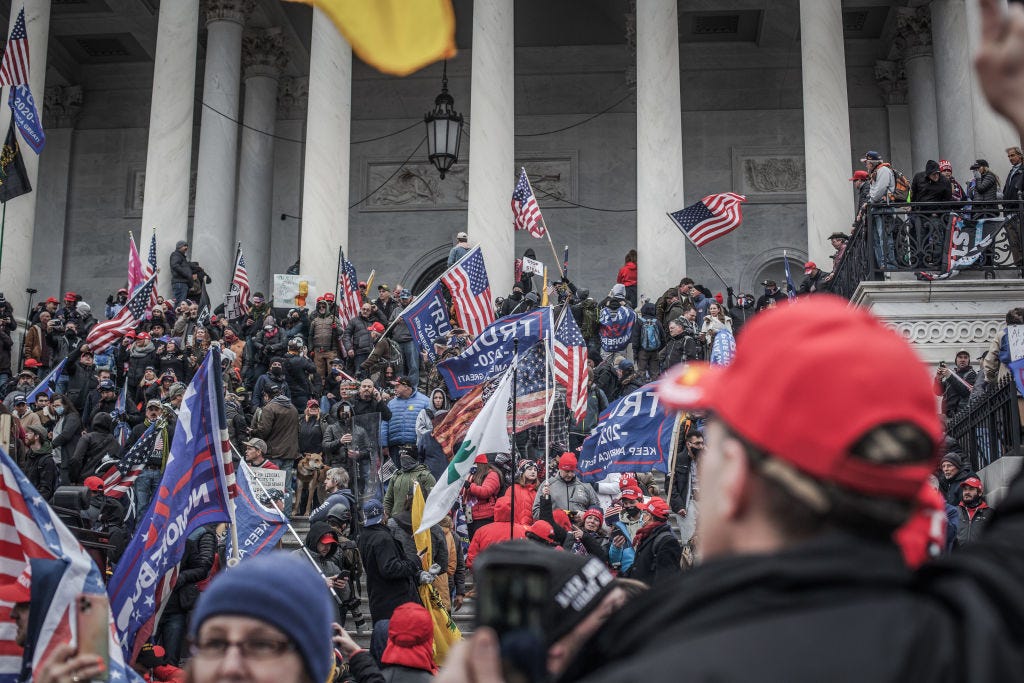There are all kinds of people in this world, but none rarer than one who identifies with both Vladimir Putin and Alexei Navalny.
Yet that was Donald Trump this week. Trump has long identified with Putin, of course, calling him a “genius” and opining, against all domestic evidence, that “the smartest one gets to the top.” More importantly, Trump has done everything in his power to make the world safer for Putin, to make the world his oyster. But when Navalny, Putin’s nemesis as leader of the Russian pro-democracy opposition, died in prison this week, Trump found himself stirred by the story of a great martyr — because Navalny reminded him of…him.
What is happening to Trump, according to Trump, is “a form of Navalny,” as he put it in a Fox News town hall with Laura Ingraham. The death of the Russian dissident had apparently made Trump “more and more aware of what is happening in our Country,” as he wrote on Truth Social, meaning, of course, what is happening to him: his personal troubles, the hundreds of millions of dollars in legal judgments he owes, the dozens of criminal indictments he is fighting: “I’m the leading candidate, I got indicted four times, I have eight or nine trials…all because of the fact that I’m in politics.”
Trump’s simultaneous identification with the Russian tyrant and the pro-democratic leader he muzzled and killed is less strange than it seems, because it is important to Trump’s project that he be both invulnerable strongman and persecuted martyr. He is a master at performing the Victim King.
For someone who has vowed to be a dictator on day one of his second term, Trump is uncommonly given to shows of vulnerability. They are coming for him, he is encircled, he is bogged down, the powerful are out to get him. At the simplest level, he is attempting to reverse the traditional flow of concern in a democracy: he wants you to worry about him instead of expecting him to worry about you. But he has also cleverly turned this exhortation to worry about him into a kind of proxy shield for his supporters: by worrying about him, you ultimately are worrying about yourself. “They want to take away my freedom because I will never let them take away your freedom — it’s very simple,” Trump has said. “Never going to let it happen. They want to silence me because I will never let them silence you. And in the end, they’re not after me; they’re after you. And I just happen to be standing in the way. It’s my honor to do so.”
This kind of appeal has been crucial to aspiring autocrats, as Ruth Ben-Ghiat has explained in an Ink interview: “This victimhood is really important because it elicits a protectiveness. So you go to Trump rallies, and people will say, ‘He’s been through so much, we’ve got to be there to support him’ — even to the point of being an army that sacks the Capitol.”
It is clear enough what’s in this for him. Nice job if you can get tens of millions of people who have much less than you to worry after you and even risk their bodies and livelihoods for you when you wouldn’t risk those things for yourself, and certainly wouldn’t risk anything for them. But what is in it for them? What does it do for people to feel part of the Victim King’s court, even in the face of all the evidence of how little he intends to do to improve your life?
One answer is that being in his air is reward enough. That the hunger he feeds isn’t for a better life or for the solutions to problems on the border or with your ability to pay your bills, but for feeling slightly better about yourself in an age of change — this era of expansion of the “we” in “we the people” — that maybe makes you feel anxious, insecure, less-than, silenced by others simply gaining voice, oppressed by greater equality, forced to adjust to the harsh fact of other people’s existence.
The Victim King complex of the aspiring autocrat is therefore mirrored in his followers. He seeks absolute power by performing weakness, and the followers turn their feelings of weakness into a sense of strength lent to them by their dear leader. “Even if one is the most miserable, the poorest, the least respected member of a group, there is compensation for one’s miserable condition in feeling ‘I am a part of the most wonderful group in the world. I, who in reality am a worm, become a giant through belonging to the group,” Erich Fromm, the German-American social psychologist, wrote in a 1973 book. He had a name for this way of being.
He called it “group narcissism.”
Photos by Patrick T. Fallon/AFP via Getty Images; Shay Horse/NurPhoto via Getty Images
This post was originally published on The.Ink.

